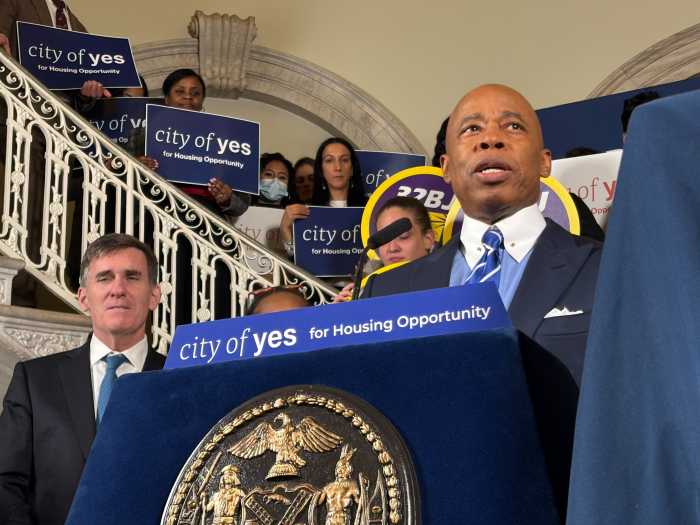BY LESLEY SUSSMAN | The new year got a bit worse this week for the Chinatown-based Fung Wah Bus company.
On Tuesday, Community Board 3 voted to refer back to committee an application by the troubled carrier to create a bus stop in front of 139 Canal St. outside the company’s storefront.
C.B. 3 did not actually vote to deny Fung Wah. But because the stipulations discussed at the committee meeting had not been signed, the matter was sent back — standard board procedure when stipulations are not signed. In fact, this action had been planned because of concerns about the stipulatons by the Fung Wah attorney.
However, a federal action against the bus company gave the board additional reason to refer back to committee.
Although Fung Wah has for years been using the Canal St. location for curbside loading and unloading for its intercity route between New York City and Boston, the carrier had wanted the city’s Department of Transportation to make it an officially licensed bus stop and sought C.B. 3 support in its effort to do so.
However, at Tuesday night’s C.B. 3 full board meeting, David Crane, chairperson of the board’s Transportation and Public Safety/Environment Committee, told board members that a vote on the application would be delayed.
“Based on what has happened to the company recently, this needs to go back to the committee,” he said. “We won’t act on this application until we can discuss these recent developments.”
The previous day, Massachusetts regulators had ordered Fung Wah to remove three-quarters of its 28-bus fleet from service after inspectors found cracks in the frames of many of the company’s aging buses.
State officials also asked federal regulators to intervene and remove the remaining seven buses in Fung Wah’s fleet from service. That action came from the U.S. Federal Motor Carrier Safety Administration on Tuesday afternoon when the entire fleet of buses was suspended. However, the F.M.C.S.A. stopped short of shutting down Fung Wah completely, allowing the company to continue to provide passenger services with buses it is chartering from other providers.
In other C.B. 3 business, several local political leaders spoke out strongly against any hasty action by the New York City Housing Authority to build luxury housing on parking lots and other open space surrounding public housing projects.
The financially strapped NYCHA recently announced its infill-development plan as a way to produce more revenue for the agency.
Patricia Olan, a spokesperson for City Councilmember Margaret Chin, said the community must be included in the loop on the discussions of the new initiative.
“While we are aware of NYCHA’s financial troubles,” she said, “a robust community engagement process must be taken prior to any new development on NYCHA land. Residents must have meaningful opportunities to provide input and recommendations.”
Also speaking out against any hasty action by NYCHA regarding the infill plan was Linda Jones, vice chairperson of C.B.3. ’s Land Use Subcommittee.
“We want to slow down this process and make sure that tenant associations have ample time to give input into the plan,” she said.
At the meeting, attended by about 100 local residents, a brief debate broke out among board members regarding the approval of a full on-premise liquor license, subject to minor stipulations, for the new owner of Lolita Bar, at 266 Broome St. The bar was closed on Valentine’s Day after undercover auxiliary police officers allegedly discovered underage drinking at the popular Lower East Side hangout. The Police Department claims this was one of several undercover operations that observed Lolita serving minors.
New C.B. 3 board member Chad Marlow sought to amend the committee’s approval of Kelly’s application, replacing it with a new resolution rejecting the application based on the police findings. Marlow argued that, with 32 establishments licensed to serve alcohol within 500 feet of Lolita’s location at 266 Broome St., “the community does not need, nor will suffer from the elimination of, a liquor-serving establishment that places minors at risk by serving them alcohol in contravention of New York State law.” Under C.B. 3 rules, unless the resolution was amended, Kelly could have signed the existing stipulation agreement after the meeting and proceeded before the State Liquor Authority with C.B. 3’s blessing.
Kelly also owns the Marshall Stack bar on Rivington St.
The stipulations include that Lolita operate as a tavern, serving small plates during all hours of operation, have a 4 a.m. closing time, play background music only and have no live bands.
Marlow’s amendment would have added new information about the “illegal sale of alcoholic beverages” to minors, which prompted the bar’s recent closing and the city’s civil lawsuit against Lolita Bar alleging that the bar served alcohol to minors.
Marlow withdrew his amendment after several board members — as well as District Manager Stetzer — objected to it, arguing that it would be unfair to add such language without proof that the charges were true.
“We don’t want to put in writing any language whose facts we can’t verify yet,” said board Chairperson Gigi Li.
In response, Marlow substituted his amendment with a new one denying Kelly’s application and stating C.B. 3 would not support any new license application until information about the underage drinking allegations, and the related New York City lawsuit against the bar, could be fully ascertained. The amended resolution was subsequently adopted by the full board.
Li added that the application for the new liquor license would continue to be denied unless the new owner agrees to C.B. 3’s original list of stipulations.
New state Senator Brad Hoylman, former chairperson of Community Board 2, made his first appearance before C.B. 3, and told the full board that one of his top priorities was to make the S.L.A.’s methods of operation clearer to the public.
“This is an issue I’m spearheading,” he said. “We want them to get more user-friendly. We want them to post online their procedures. This will make it easier for liquor license holders and the public.”
Also appearing at the board meeting was Joyce Mendelsohn. The author of “The Lower East Side Remembered and Revisited,” she urged landmark designation for the Seward Park Branch Public Library, at 192 East Broadway.
“One hundred years after it was built this library is still going strong as a place where ordinary people can come, free of charge, for knowledge, inspiration, instruction and enjoyment to be found on the printed page of online,” she said.
She asked C.B. 3 to support landmark designation for the library for its “architectural excellence and its historic and cultural importance to the Lower East Side community.”
On another matter, a spokesman for state Senator Daniel Squadron told the board that a section of the Pier 42 waterfront park, between Jackson and Montgomery Sts., will open for interim recreational use starting May 4.
Reading a statement from Squadron, Mauricio Pazmino said that “along with U.S. Senator Charles Schumer and the Parks Department, the planning for the redevelopment of the pier into a full park proceeds.”




































